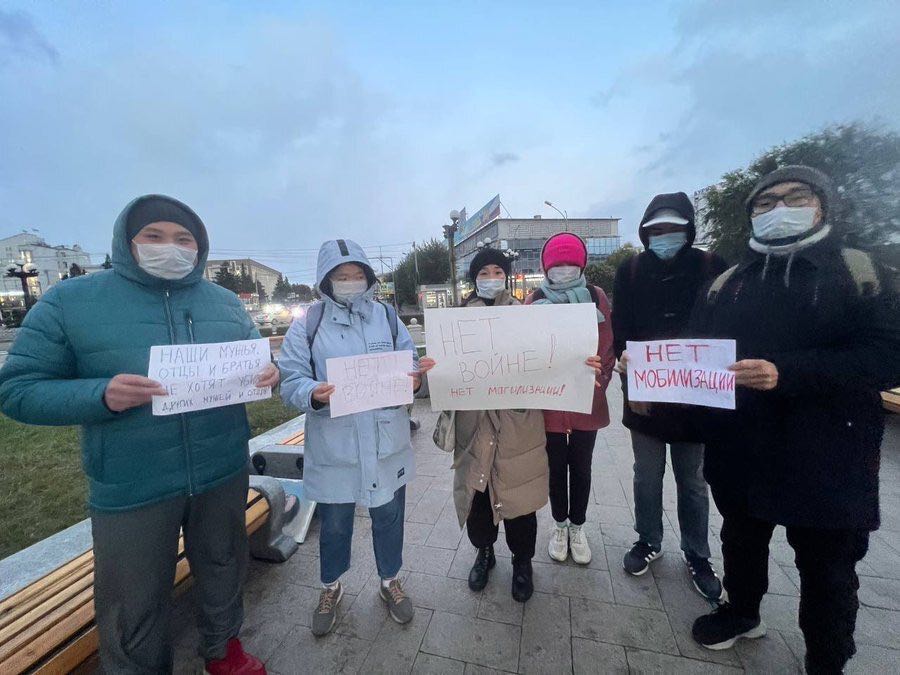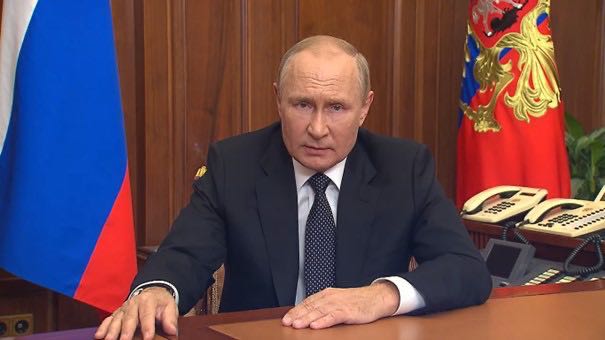The 'partial' mobilization that Russian president Putin announced on September 21 has caused an exodus of Russian men and women, writes Radio Free Europe/Radio Liberty correspondent Mike Eckel. Seven months in, Putin's address makes the war seep further into Russian society. The announcement was met with protests in several Russian cities, as well as long lines at many border crossings.
By Mike Eckel
 After Putin's announcement, long traffic jams formed at the Russian-Georgian border. Image Telegram.
After Putin's announcement, long traffic jams formed at the Russian-Georgian border. Image Telegram.
In some regions, men are driven off in buses, with wives, mothers, and sisters sobbing openly and waving goodbye. In other places, men say they’re steeling themselves for battle. On the borders with Kazakhstan, Georgia, and Mongolia, long lines of cars are reported as people try to urgently leave the country.
Russian President Vladimir Putin’s order for a “partial” mobilization, announced in a recorded televised address on September 21, aims to transform Russia’s faltering war in Ukraine, injecting an influx of men into the now seven-month-old conflict.
The order is also already showing signs of transforming Russian society in a way not seen in generations, putting the country on a war footing, even as the Kremlin resists uttering the word “war.”
Defense Minister Sergei Shoigu said the mobilization could put up to 300,000 men on the battlefield, to replenish 70,000-80,000 casualties that Western officials say Russia has suffered since the February 24 invasion. Judging by the scope of the mobilization effort, reflected anecdotally in news reports, videos, and audio recordings around the country, the 300,000 figure may turn out to be a smokescreen for a much larger target figure.
Novaya Gazeta Europe, a venerable Russian newspaper that was reconfigured outside the country after being shuttered by authorities, reported on September 22 that a classified clause listed on Putin’s mobilization order envisioned up to 1 million people being drafted. The paper cited an unnamed official in the presidential administration.
The Russia-oriented news site Meduza, citing an unnamed official “close to one of the country’s federal ministries,” said the classified plan called for 1.2 million people to be conscripted.

If Not Us, Then Who?
In the two days since Putin announced his decree, a trickle of reports documenting mobilization efforts across Russia has become a flood. In the Pacific region of Primorye, police cars were recorded driving through one remote town’s streets with a loudspeaker announcing the location of recruiting offices and the documentation men must bring when they appear.
In Bolshoi Kamen, an industrial port known for a sprawling submarine and shipbuilding complex, one reporter from the local news site Deita.ru interviewed men who lined up outside a recruiting station before 9 a.m. “Who else are they to going to send?” one man was quoted as saying. “Old people? Children? Women? If not us, then who?”
Videos from Yakutia, the northern Siberian region formally known as Sakha, showed large crowds of men gathering at military recruiting stations, getting onto buses and an airplane. Аt one distant village in southeastern Yakutia, a loudspeaker broadcast a recording of the famous Soviet war song Katyusha, as men hugged relatives and said farewell.
On the other side of the country, in the North Caucasus region of Kabardino-Balkaria, a crowd confronted a recruiting officer inside an auditorium as the officer explained procedures for mobilizing men. When he said that his own son will not be going to fight due to a “happy coincidence,” the crowd erupted in anger.
 The first protests against mobilization took place in Russia's Far East, such as in Ulan Ude. Image: Twitter.
The first protests against mobilization took place in Russia's Far East, such as in Ulan Ude. Image: Twitter.
In Simferopol, on the Black Sea peninsula of Crimea, which Russia seized from Ukraine in 2014, a YouTube video showed long lines of men outside one of the capital city’s recruiting stations, waiting to board buses. Reportedly, a majority of the men were Crimean Tatars, an ethnic group that has opposed the Russian takeover and has been repeatedly persecuted by Russian authorities.
The video could not be immediately verified, but Tamila Tasheva, a Ukrainian government representative for the occupied peninsula, said in a post to Facebook that at least a thousand draft orders have been distributed throughout Crimean Tatar villages. She also said that “raids” were occurring in schools and markets in Tatar-majority regions, with men targeted for mobilization “loaded into cars and taken to the military registration and enlistment offices."
"Do all you can, use all legal and 'illegal' methods to not be mobilized," she wrote.
'I Don't Think People Even Understand What's Going On'
In the central Russian region of Chuvashia, dozens of encrypted chat rooms – using applications like WhatsApp, Viber, or Telegram -- have sprung up as people anxiously discuss what mobilization means; and how to avoid it.
“The whole situation seems strange to me. Russia has a lot of people in reserve. Where do they need so many people now? What will they all do there in Ukraine?” a 33-year-old mother of two who gave only her first name, Olga. She said her husband is a corporal in the military reserves, so he qualifies under the mobilization order.
“In my circles, friends and just acquaintances, they’re discussing only one topic: where to hide my husband?” she told Idel.Realities, a regional news project of RFE/RL’s Tatar-Bashkir Service. “What else are you supposed to do? Either hide, and then be afraid not to be imprisoned, or you go and fight.”
Another woman who asked to be identified as Inna said both she and her husband were obligated under mobilization orders. Her husband is a lieutenant in the reserves, she said. “Draft orders came [September 21] to colleagues at work,” she said. “The boys have just completed their military service. The mothers are in a panic; they say, ‘We won’t let them go.’ Everyone is crying.”
“I decided there was no point in panicking,” she said. “’They will summon us; we will all go’ -- that's what my husband says. I don't see the point of running anywhere. To be honest, I don’t understand people who run -- you can’t escape gravity anyway.”
One man who lives in the Volga River city of Kazan told RFE/RL’s Tatar-Bashkir Service that he had served in Russian military intelligence several years ago and fully expected to be called up, but that the invasion of Ukraine was pointless. “On the one hand, I’m calm. But still I can’t imagine being sent to war,” he said. “However, this is reality. In the summer, when the situation began to escalate, there were thoughts of leaving the country, but my relatives and friends are here, my native land is here, so in the end I stayed.”
“I don't think people even understand what's going on. No one seems to be able to stop what is happening. Unless, by some miracle, aliens arrive.... To be honest, I’m thinking about whom I should leave my possessions to.”
In Moscow, one of several cities where scattered protests erupted after Putin’s address was broadcast and the order was published, local news outlets reported male detainees being issued draft orders while being held in police buses awaiting processing on misdemeanor charges.
The deepening anxiety in parts of Russian society was also reflected in reports of an exodus of Russian men, and women, apparently fleeing mobilization. The country has already seen an outflux of workers to places like Yerevan and Tbilisi, where Russian is widely understood and short-term visas are not required.
Lines of cars, along with cargo trucks, up to six kilometers long were reported on September 22 at Verkhny Lars, a major border crossing that sits astride the main highway connecting Georgia with Russia’s North Caucasus.
 President Putin's televized announcement of mobilization. Image kremlin.ru.
President Putin's televized announcement of mobilization. Image kremlin.ru.
Problems with morale and discipline
Putin’s mobilization order comes at a critical moment for the Russian invasion, and follows months of setbacks and outright defeats for Russian forces in some parts of Ukraine. Earlier this month, Ukrainian forces pulled off a stunning counteroffensive in the northeastern Kharkiv region.
With signals mounting that the battlefield defeats might push the Kremlin toward complete mobilization, military analysts cautioned that a Russia’s military training and recruitment system was not up to the task to dealing with a huge influx of people.
Experts also said it would take months to train, equip, and deploy the new troops in any sizable numbers, giving Ukrainian forces additional time to launch new offensives: into the Luhansk region, for example, or in the southern Kherson region.
Some of the new personnel will also come from either suborning existing “contract soldiers” -- either conscripts finishing up their mandatory military service, or men who have volunteered and signed short-term contracts to serve – or outright canceling their contracts and ability to leave service.
However, that could result in serious problems with morale and discipline, according to Max Bergmann, the director of the Europe Program at the Center for Strategic and International Studies, a Washington-based think tank .
“The existential danger for Putin is that his decision will, if it is at all impactful, bring the war home to more Russians,” he wrote in a commentary.” Wars are popular until they suddenly are not.”
This article was originally published by Radio Free Europe/Radio Liberty.
